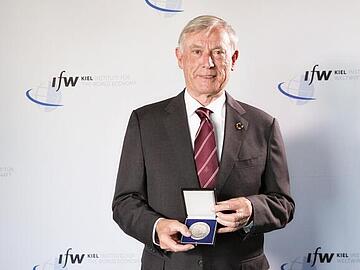Global Economy Prize Laureate 2017
Horst Köhler

Horst Köhler was born on February 22, 1943, in the Polish town of Skierbieszów. He was the seventh of eight children. In 1944, his family fled from the advancing Soviet troops to Markkleeberg-Zöbigker, near Leipzig. In 1953, the Köhlers managed to flee to the Federal Republic via West Berlin, just prior to the June 17 uprising. The family finally found a new home in the Swabian town of Ludwigsburg.
Köhler studied economics in Tübingen, where he earned his doctorate in 1977 with a thesis on the labor market impact of technical progress. In 1976, Köhler took up a position in the strategy department of the Federal Ministry of Economics in Bonn; in 1981, he joined the CDU and became advisor to State Prime Minister Gerhard Stoltenberg in Kiel. From 1982, Köhler worked in various management positions, including running the minister's office at the Ministry of Finance in Bonn. In 1990, Finance Minister Theo Waigel appointed him undersecretary with responsibility for financial and monetary relations. As part of German reunification, Köhler conducted negotiations with the East German leadership on a German currency union. In Moscow, he negotiated the agreement on the withdrawal of Soviet troops from East Germany. He served as chief negotiator for the Maastricht Treaty on European Monetary Union. In 1992, Köhler acted as a so-called "sherpa," organizing the World Economic Summit in Munich, where Germany hosted the G7 meeting of the seven leading industrialized countries.
In 1993, Köhler resigned from the federal government to become president of the German Savings Bank Association. In 1998, at the request of Helmut Kohl, he took over as President of the European Bank for Reconstruction and Development in London. On the recommendation of Chancellor Gerhard Schröder, Horst Köhler was appointed Managing Director of the International Monetary Fund in Washington, D.C. in 2000.
On May 23, 2004, Köhler was elected the ninth president of the Federal Republic of Germany and assumed his new office on 1 June. Domestically, Köhler focused mainly on the question of how to create and secure sustainable jobs and saw an opportunity to build a new, inclusive coexistence between old and young. He considered Germany to be a "land of ideas" capable of acting as a force for good in the world and particularly in the European Union. With regard to foreign policy, he campaigned for a more equitable form of globalization governed by reliable rules and was especially active in the fight against poverty in Africa. On May 31, 2010, just over a year after he had been confirmed in office for another five years, he resigned from his post as president. He explained his decision as the result of what he saw as unfair criticism of his comments on Germany’s military deployment in Afghanistan, which he felt had been exploited for political purposes.
Today, Köhler remains strongly committed to the struggle for equality of opportunity and the equitable distribution of wealth, as well as for development and the fight against poverty in Africa. Among his various activities, he is involved in providing advice to the G20 on financial matters and helped prepare proposals for new global development goals on behalf of the United Nations. Köhler is married and has a son and a daughter.